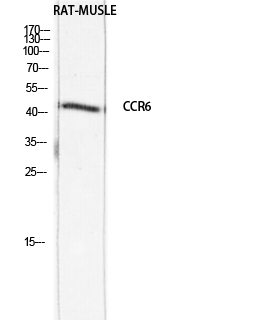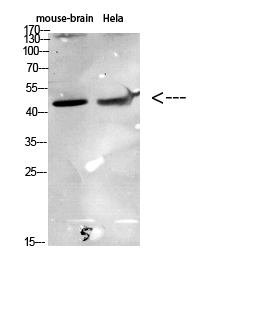CKR-6 Polyclonal Antibody
- Catalog No.:YT5714
- Applications:WB;ELISA
- Reactivity:Human;Mouse
- Target:
- CKR-6
- Fields:
- >>Cytokine-cytokine receptor interaction;>>Viral protein interaction with cytokine and cytokine receptor;>>Chemokine signaling pathway
- Gene Name:
- CCR6
- Protein Name:
- C-C chemokine receptor type 6
- Human Gene Id:
- 1235
- Human Swiss Prot No:
- P51684
- Mouse Gene Id:
- 12458
- Mouse Swiss Prot No:
- O54689
- Immunogen:
- The antiserum was produced against synthesized peptide derived from the N-terminal region of human CCR6. AA range:1-50
- Specificity:
- CKR-6 Polyclonal Antibody detects endogenous levels of CKR-6 protein.
- Formulation:
- Liquid in PBS containing 50% glycerol, 0.5% BSA and 0.02% sodium azide.
- Source:
- Polyclonal, Rabbit,IgG
- Dilution:
- WB 1:500 - 1:2000. ELISA: 1:10000. Not yet tested in other applications.
- Purification:
- The antibody was affinity-purified from rabbit antiserum by affinity-chromatography using epitope-specific immunogen.
- Concentration:
- 1 mg/ml
- Storage Stability:
- -15°C to -25°C/1 year(Do not lower than -25°C)
- Other Name:
- CCR6;CKRL3;CMKBR6;GPR29;STRL22;C-C chemokine receptor type 6;C-C CKR-6;CC-CKR-6;CCR-6;Chemokine receptor-like 3;CKR-L3;DRY6;G-protein coupled receptor 29;GPR-CY4;GPRCY4;LARC receptor;CD196
- Observed Band(KD):
- 42kD
- Background:
- This gene encodes a member of the beta chemokine receptor family, which is predicted to be a seven transmembrane protein similar to G protein-coupled receptors. The gene is preferentially expressed by immature dendritic cells and memory T cells. The ligand of this receptor is macrophage inflammatory protein 3 alpha (MIP-3 alpha). This receptor has been shown to be important for B-lineage maturation and antigen-driven B-cell differentiation, and it may regulate the migration and recruitment of dentritic and T cells during inflammatory and immunological responses. Alternatively spliced transcript variants that encode the same protein have been described for this gene. [provided by RefSeq, Jul 2008],
- Function:
- caution:It is uncertain whether Met-1 or Met-6 is the initiator.,domain:Contains a RS region (arginine-serine dipeptide repeat) within the C-terminal domain which is the hallmark of the SR family of splicing factors. This region probably plays a role in protein-protein interactions.,function:Receptor for a C-C type chemokine. Binds to MIP-3-alpha/LARC and subsequently transduces a signal by increasing the intracellular calcium ions level.,function:Transcriptional regulator which participates in regulating the pre-mRNA splicing process. Also modulates the expression of critical apoptotic factor, leading to cell apoptosis.,induction:By interleukin-2.,online information:CC chemokine receptors entry,similarity:Belongs to the cyclin family. Cyclin L subfamily.,similarity:Belongs to the G-protein coupled receptor 1 family.,subunit:Interacts with CDC2L1 or CDC2L2, SFRS2, SFRS7 and POLR2A, the h
- Subcellular Location:
- Cell membrane ; Multi-pass membrane protein . Cell surface .
- Expression:
- Sperm. Mainly localized in the tail and in the postacrosomal region but is also found in the midpiece and basal region in a small percentage of sperm cells. Reduced levels found in the sperms of asthenozoospermia and leukocytospermia patients (at protein level). Spleen, lymph nodes, appendix, and fetal liver. Expressed in lymphocytes, T-cells and B-cells but not in natural killer cells, monocytes or granulocytes.
- June 19-2018
- WESTERN IMMUNOBLOTTING PROTOCOL
- June 19-2018
- IMMUNOHISTOCHEMISTRY-PARAFFIN PROTOCOL
- June 19-2018
- IMMUNOFLUORESCENCE PROTOCOL
- September 08-2020
- FLOW-CYTOMEYRT-PROTOCOL
- May 20-2022
- Cell-Based ELISA│解您多样本WB检测之困扰
- July 13-2018
- CELL-BASED-ELISA-PROTOCOL-FOR-ACETYL-PROTEIN
- July 13-2018
- CELL-BASED-ELISA-PROTOCOL-FOR-PHOSPHO-PROTEIN
- July 13-2018
- Antibody-FAQs
- Products Images

- Western blot analysis of RAT-MUSLE lysis using CCR6 antibody. Antibody was diluted at 1:1000. Secondary antibody(catalog#:RS0002) was diluted at 1:20000

- Western Blot analysis of various cells using Antibody diluted at 1:1000. Secondary antibody(catalog#:RS0002) was diluted at 1:20000



